The American era marked a transformative period for the Philippines, particularly in the realm of education and society. During this time, Filipino thinkers emerged as pivotal figures, shaping public discourse and national identity. Their contributions were not just academic but also deeply rooted in cultural activism and critical thinking.
American education reforms played a significant role in this intellectual awakening. Schools and universities became hubs for debate and scholarly work, fostering a new generation of thinkers. These individuals drew inspiration from global figures like Socrates, who emphasized the importance of questioning and dialogue.
The press also became a powerful tool for these thinkers, allowing them to reach a broader audience. Through articles and public discussions, they addressed pressing social issues, laying the groundwork for modern Philippine society. Their efforts were instrumental in shaping the nation’s history and identity.
This article delves into the lives and contributions of these remarkable individuals. It explores how their work continues to influence the Philippines today, offering a comprehensive look at their enduring legacy.
Key Takeaways
- Filipino thinkers played a crucial role during the American era.
- American education reforms spurred intellectual growth.
- The press was a key platform for public discourse.
- Cultural activism and critical thinking shaped national identity.
- Global intellectual figures inspired Filipino scholars.
- Their contributions remain influential in modern society.
Historical Foundations of Filipino Intellectualism
The early 20th century saw a surge in intellectual discourse among Filipino thinkers. This period, shaped by American colonial rule, became a turning point for the development of scholarly thought in the Philippines. Educational reforms introduced by the United States played a pivotal role in fostering a culture of critical thinking and debate.
During this era, Filipino scholars were exposed to global ideas, particularly from Europe and America. Thinkers like Antonio Gramsci and Noam Chomsky influenced discussions on politics and democracy. These ideas were adapted to address local issues, creating a unique blend of global and Filipino perspectives.
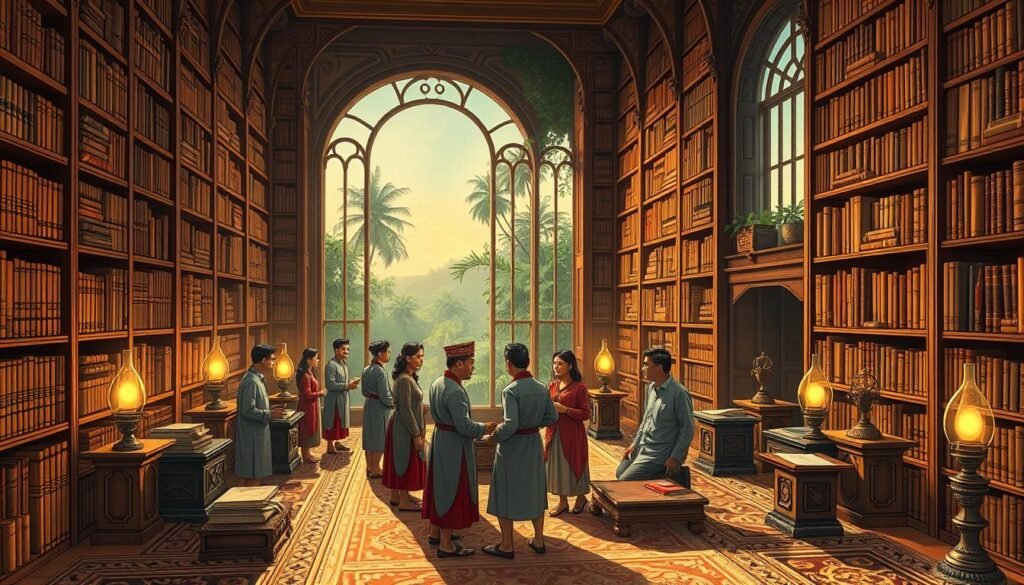
The rise of public discourse was further fueled by the press. Newspapers and books became platforms for sharing theories and ideas. Works like Asian Place, Filipino Nation highlighted the interconnectedness of global intellectual movements and their impact on the Philippines.
Political debates during this time also shaped the intellectual landscape. Discussions on nationalism and freedom were influenced by global events, such as the Bolshevik Revolution and the rise of Japan. These debates helped Filipino thinkers refine their own theories on governance and identity.
“The intellectual awakening of the Philippines was not just a local phenomenon but a product of global exchanges.”
Cultural exchange played a significant role in this evolution. The concept of Malayness, for instance, became a unifying idea among Filipino nationalists. This idea, rooted in Pan-Asianism, helped shape a distinct Filipino identity.
For a deeper understanding of this transformative period, explore how colonial influences shaped Philippine progress. This historical foundation set the stage for the cultural renaissance and public impacts discussed in later sections.
Cultural Renaissance: Arts and Literature in Context
Arts and literature flourished as powerful tools for shaping national identity in the Philippines. During the American era, Filipino artists and writers emerged as voices of change, reflecting and redefining the nation’s cultural landscape. This period marked a cultural renaissance, where creativity became a means to challenge societal norms and inspire unity.
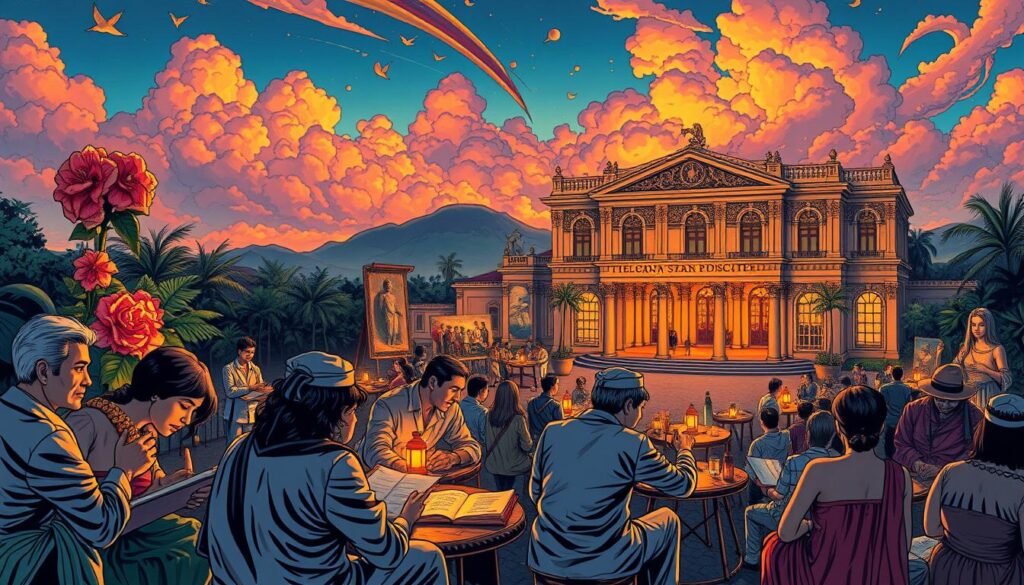
Literary Contributions Shaping National Identity
Literary works played a crucial role in shaping the Philippines’ national identity. Writers used their craft to address pressing social issues, from colonialism to inequality. Their stories and poems became a mirror of society, reflecting its struggles and aspirations.
Thinkers like Noam Chomsky influenced Filipino writers, encouraging them to critique power structures and advocate for change. This blend of global and local ideas created a unique literary movement that resonated deeply with the public. Through their works, writers inspired a sense of pride and resilience among Filipinos.
The Role of Press and Media in Cultural Change
The press and media were instrumental in driving cultural change during this era. Newspapers and magazines became platforms for public discourse, allowing writers and journalists to share revolutionary ideas. These media outlets nurtured debates on nationalism, democracy, and social justice.
Media platforms also amplified the voices of marginalized groups, fostering a more inclusive cultural movement. By challenging old orders and promoting new perspectives, the press played a pivotal role in shaping modern Philippine society. Its influence extended beyond information dissemination, becoming a catalyst for societal transformation.
For a deeper dive into the impact of cultural movements, explore how historical figures shaped Philippine identity. This cultural renaissance remains a testament to the enduring power of art and media in shaping a nation’s identity.
Influential Filipino Scholars and Public Figures
Filipino scholars emerged as key figures, blending academic rigor with cultural activism. Their work reshaped public discourse and inspired a new generation of thinkers. During the American era, these individuals transcended traditional roles, leaving a lasting impact on politics and society.
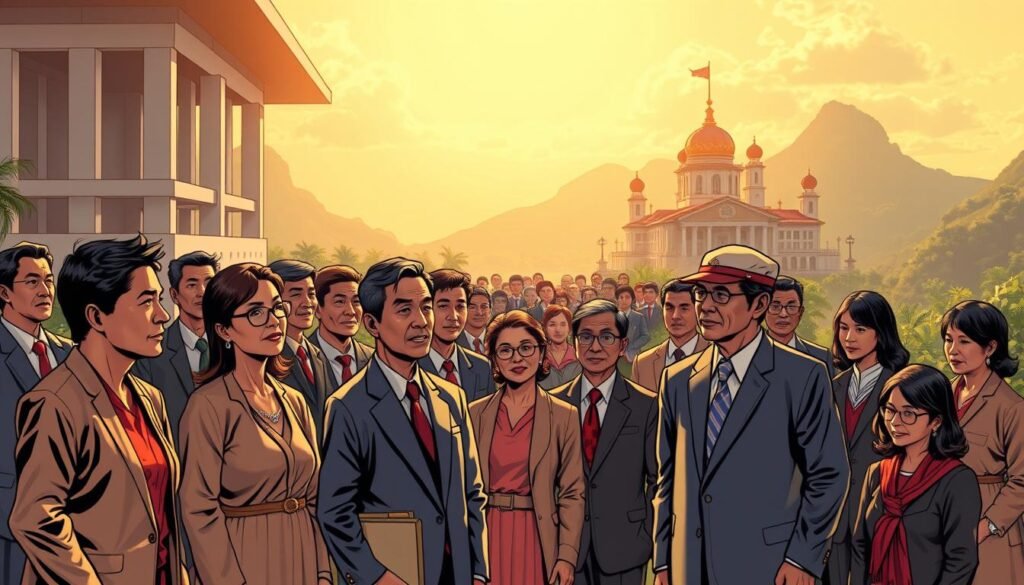
Profiles of Trailblazing Academics and Writers
One man who stood out was José Rizal. His novels, Noli Me Tangere and El Filibusterismo, exposed injustices under Spanish rule. Rizal’s writings became a catalyst for change, inspiring the Propaganda Movement.
Another example is Marcelo H. del Pilar, a journalist and reformist. Through his work in La Solidaridad, he advocated for legal equality and social justice. His contributions laid the groundwork for modern Filipino nationalism.
Graciano López Jaena, a prolific writer and orator, also played a pivotal role. His speeches and essays challenged colonial oppression, earning him a place among the nation’s most revered intellectuals.
Pathways to Becoming a Public Intellectual
Becoming a public intellectual requires a unique blend of skills. These individuals often start as scholars, using their academic work to address societal issues. Over time, they expand their influence through writing, speaking, and activism.
Institutional factors, such as educational reforms, also play a role. The American era introduced new opportunities for learning, enabling scholars to engage with global ideas. This exposure helped them craft a distinct Filipino identity.
Interviews with modern scholars reveal common traits: curiosity, resilience, and a commitment to justice. These qualities, combined with a deep understanding of local issues, define the path to becoming a public intellectual.
| Scholar | Key Contributions | Impact |
|---|---|---|
| José Rizal | Novels, essays, political activism | |
| Marcelo H. del Pilar | Journalism, reformist writings | Advocated for legal equality |
| Graciano López Jaena | Speeches, essays, oratory | Challenged colonial oppression |
“The intellectual awakening of the Philippines was not just a local phenomenon but a product of global exchanges.”
These scholars exemplify the evolving definition of a public intellectual. Their legacy continues to inspire, proving that one person’s work can transform an entire nation.
The Role of Intellectuals in Public Life
The 20th century witnessed a unique convergence of academic thought and public activism in the Philippines. Thinkers played a pivotal role in bridging the gap between scholarly ideas and grassroots movements. Their work not only shaped public discourse but also influenced policy and politics in profound ways.
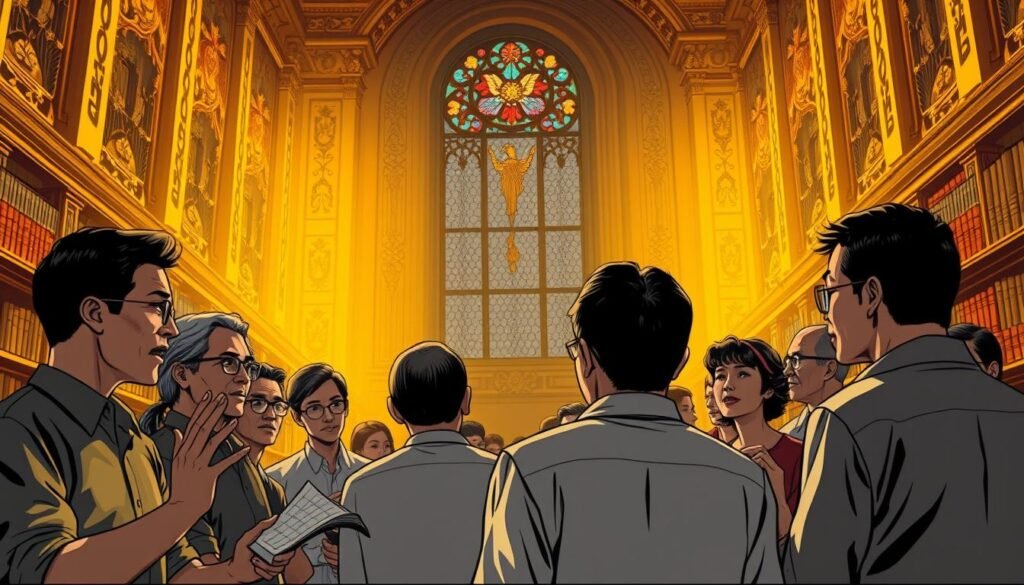
One of the key contributions of these individuals was their ability to translate complex theory into actionable change. For example, Noam Chomsky’s critiques of power structures inspired Filipino scholars to question authority and advocate for social justice. This blend of global and local ideas created a powerful framework for activism.
“The responsibility of intellectuals is to speak the truth and expose lies.”
Debates over the impartial role of thinkers versus their political commitments were common during this era. Some argued that intellectuals should remain neutral, while others believed their work must directly address societal issues. These discussions shaped the way scholars engaged with public life.
Bridging Academia and Activism
Thinkers often served as mediators between academic institutions and grassroots movements. Their ability to analyze complex issues and communicate them effectively made them invaluable in shaping public opinion. This role was particularly evident during times of political strife, such as the war and social upheavals of the 20th century.
Case studies from this period highlight how scholarly ideas directly influenced social reforms. For instance, the works of Filipino scholars during the American era laid the groundwork for modern democracy. Their efforts demonstrated the enduring impact of intellectual debate on state policy and public life.
| Scholar | Contribution | Impact |
|---|---|---|
| Noam Chomsky | Critiques of power structures | Inspired global activism |
| Filipino Reformists | Advocacy for social justice | Shaped modern democracy |
| 20th Century Thinkers | Bridging theory and practice | Influenced public policy |
These examples illustrate the critical role thinkers played in shaping the Philippines’ public life. Their legacy continues to inspire, proving that ideas can transform societies and drive meaningful change.
Education and Policy Shifts Under American Influence
The American colonial period brought significant changes to the Philippine education system, reshaping its foundations. The United States introduced reforms that emphasized modern pedagogy and universal access to education. These changes aimed to prepare Filipinos for self-governance while aligning with American ideals.
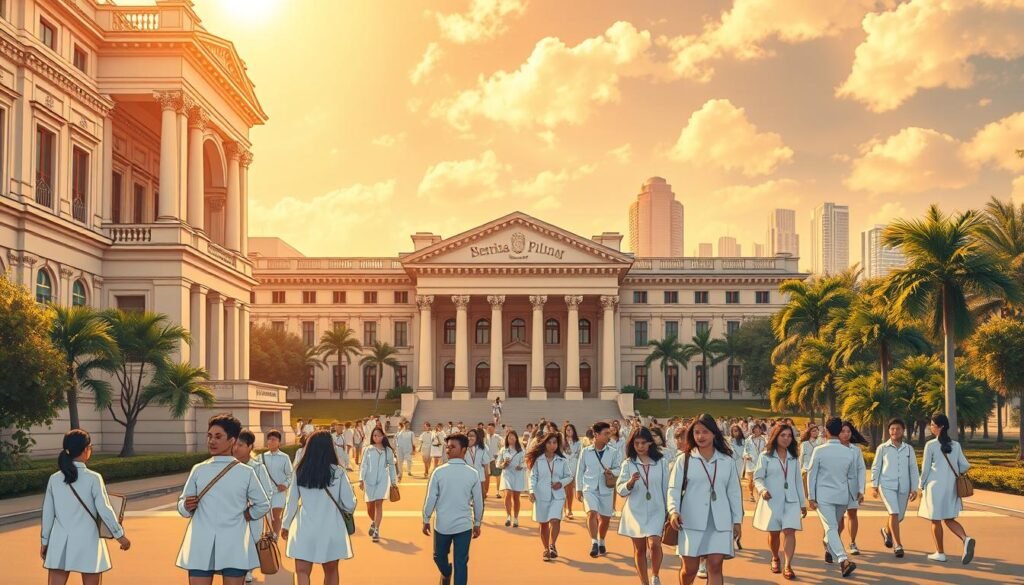
One of the most notable reforms was the introduction of English as the medium of instruction. This shift not only facilitated communication but also exposed Filipinos to global ideas. The curriculum was redesigned to include subjects like science, mathematics, and history, fostering critical thinking and practical skills.
Curriculum Reforms and Modern Pedagogy
American educators introduced progressive teaching methods that emphasized student participation and experiential learning. These approaches replaced rote memorization, encouraging students to question and analyze. Books like Educational Psychology by Edward L. Thorndike influenced these pedagogical shifts.
The reforms also prioritized teacher training, ensuring educators were equipped to implement modern methods. This focus on professional development elevated the quality of education across the country. As a result, schools became hubs for intellectual growth and public discourse.
Long-Term Impacts on Philippine Institutions
The changes introduced during this era had lasting effects on Philippine institutions. The establishment of public schools and universities created opportunities for more Filipinos to access education. This democratization of learning helped bridge social divides and fostered a sense of national identity.
Policy changes also reshaped the role of education in governance. The emphasis on critical thinking and civic responsibility prepared Filipinos for leadership roles. Over time, these reforms laid the groundwork for a more informed and engaged citizenry.
“Education is the most powerful weapon which you can use to change the world.”
Today, the legacy of these reforms is evident in the Philippines’ educational system. The emphasis on modern pedagogy and universal access continues to shape the nation’s progress. By examining this history, we gain a deeper understanding of how education can transform societies.
Intersections of Gender, Politics, and Intellectual Thought
The intersection of gender and politics has long been a cornerstone of intellectual discourse in the Philippines. This dynamic interplay has shaped scholarly debates and influenced social movements, particularly in the quest for justice and equality. By examining how gender roles and political advocacy intersect, we gain a deeper understanding of the transformative power of ideas.
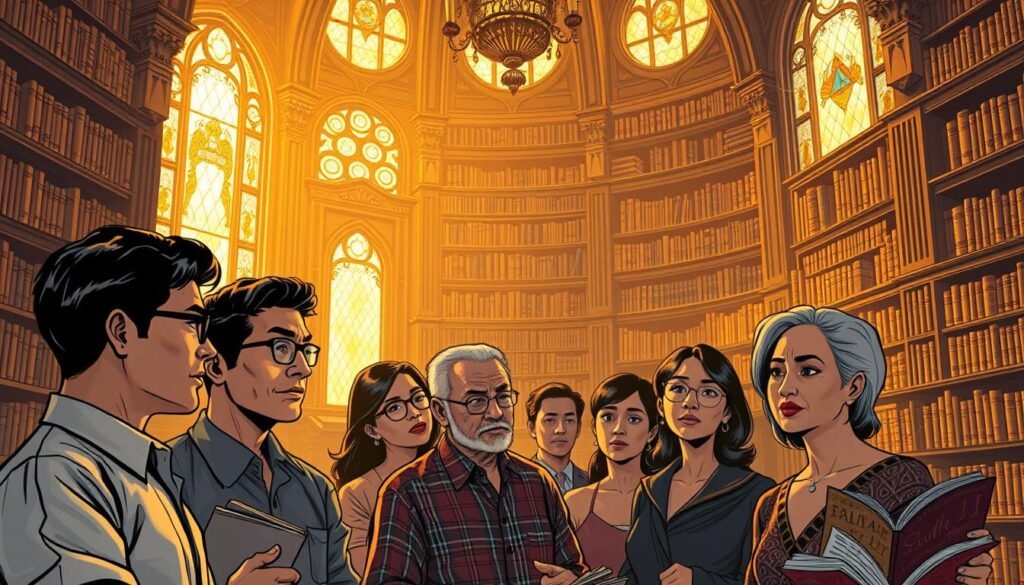
Gender Roles in Shaping Scholarly Discourse
Gender roles have significantly influenced the evolution of scholarly discourse in the Philippines. Women, often marginalized in traditional settings, have emerged as powerful voices in academia and public life. Their work has challenged societal norms and expanded the boundaries of intellectual thought.
For example, the concept of intersectionality, introduced by Kimberlé Crenshaw, has been pivotal in understanding how overlapping identities—such as race, class, and gender—shape experiences of oppression. This framework has been adapted by Filipino scholars to address local issues, fostering a more inclusive approach to intellectual discourse.
- Women’s contributions to literature and media have redefined cultural narratives.
- Feminist theories have influenced debates on power and social justice.
- Educational reforms have empowered women to take on leadership roles in academia.
Political Advocacy and the Quest for Justice
Political advocacy has been a driving force in the fight for gender equality and social justice. Filipino thinkers have used their platforms to challenge systemic inequalities and advocate for policy changes. Their efforts have been instrumental in shaping public opinion and influencing legislative reforms.
One notable example is the role of the press in amplifying marginalized voices. Media platforms have provided a space for public intellectuals to address issues of gender and power, fostering a culture of critical thinking and activism. This has led to significant advancements in the recognition of women’s rights and the promotion of social justice.
“The responsibility of intellectuals is to speak the truth and expose lies.”
International debates, particularly those involving British intellectual traditions, have also influenced Filipino scholars. These global exchanges have enriched local discussions, providing comparative insights into the intersection of gender and politics.
For a deeper exploration of these themes, consider how intersectionality has shaped social justice movements globally. This multifaceted approach highlights the enduring impact of intellectual thought on politics and gender.
From Salon Debates to Modern Media Platforms
The evolution of intellectual debate has shifted from intimate salon gatherings to expansive digital platforms, reshaping how ideas are shared and discussed. In the past, salons were spaces where thinkers gathered to exchange ideas in person. Today, digital media has transformed these conversations, making them accessible to a global audience.
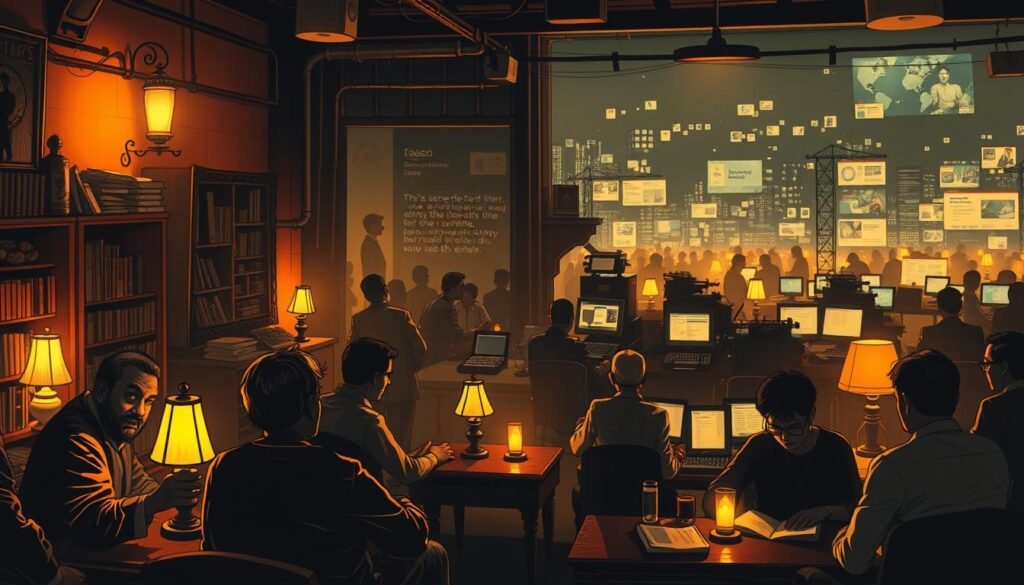
The Transition from Traditional Discourse to Digital Conversations
Salons, which originated in the 17th century, were hubs for intellectual exchange. They provided a platform for marginalized voices and fostered critical debates on topics like liberty and equality. These gatherings were often curated by influential women, known as salonnières, who shaped the direction of discussions.
With the rise of the internet, these intimate debates have moved online. Digital platforms now serve as modern salons, where people from diverse backgrounds can engage in meaningful conversations. This shift has democratized intellectual discourse, allowing more voices to be heard.
Figures like Noam Chomsky have played a significant role in this transition. His critiques of power structures have inspired online debates, encouraging people to question authority and advocate for social justice. Digital media has amplified these ideas, making them accessible to a broader audience.
“The responsibility of intellectuals is to speak the truth and expose lies.”
Events like March news cycles have also been amplified through modern media. Platforms like Twitter and Facebook allow real-time discussions, turning global events into opportunities for public discourse. This has transformed how we engage with politics and culture.
Journalistic practices have also evolved, blending historical debate with new media trends. Articles and blogs now serve as digital salons, fostering discussions that were once confined to physical spaces. This innovation has made intellectual thought more dynamic and inclusive.
For a deeper understanding of this shift, explore how salon culture has adapted to the digital age. This evolution highlights the enduring power of ideas in shaping our world.
Global Exchanges and Cross-Cultural Influences
Global exchanges have long shaped the intellectual traditions of the Philippines, blending diverse cultural influences. From European enlightenment ideas to Asian philosophies and American educational reforms, these cross-cultural dialogues have left a lasting mark on Filipino thought. This section explores how these exchanges have both constrained and catalyzed intellectual innovation in the Philippines.
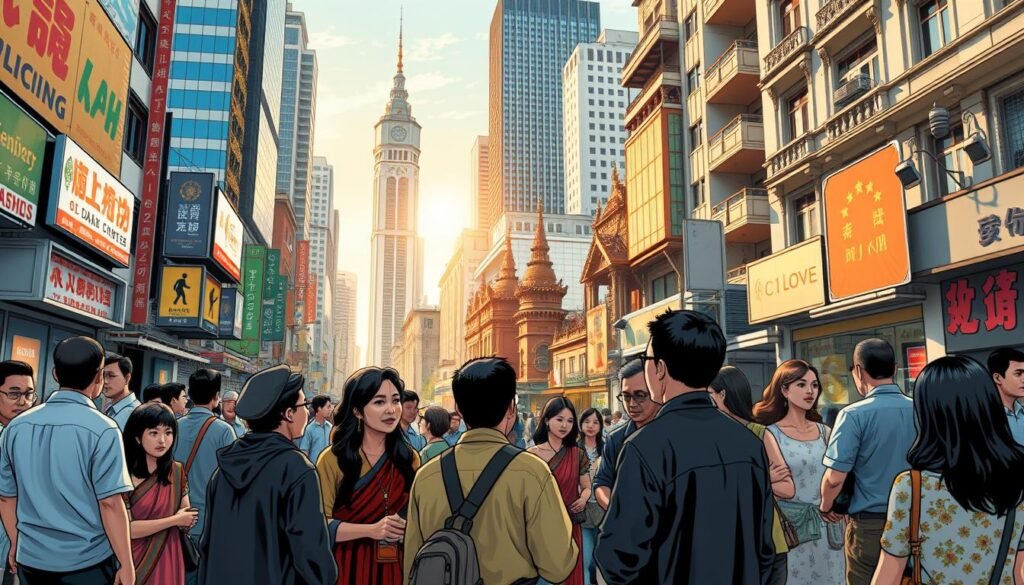
Comparative Perspectives: Europe, Asia, and the United States
European thinkers like Antonio Gramsci and Karl Mannheim have significantly influenced Filipino scholars. Their theories on culture and society provided frameworks for understanding power dynamics and social change. Similarly, Asian philosophies, particularly from China and Japan, introduced concepts of harmony and collective identity.
The United States played a pivotal role through educational reforms. American ideals of democracy and individualism were integrated into local curricula, fostering critical thinking. These diverse influences created a unique intellectual landscape in the Philippines.
“The globalization of ideas has transformed local traditions, creating a dynamic interplay of global and local perspectives.”
Colonial Legacies and Modern Intellectual Traditions
Colonial legacies have both constrained and catalyzed intellectual innovation. While colonial rule imposed foreign systems, it also exposed Filipinos to global ideas. The press became a vital platform for public discourse, mediating these cross-cultural exchanges.
Books and academic works from Britain and other nations shaped local ideas. For example, Noam Chomsky’s critiques of power structures inspired Filipino scholars to question authority. These global debates influenced policy and societal order, leaving a lasting impact on the Philippines.
| Region | Key Influence | Impact on the Philippines |
|---|---|---|
| Europe | Theories on culture and society | Provided frameworks for understanding power dynamics |
| Asia | Philosophies of harmony and identity | Introduced collective and cultural perspectives |
| United States | Educational reforms and democracy | Fostered critical thinking and individualism |
These exchanges highlight the ongoing dialogue between past colonial influences and modern intellectual traditions. By examining these global connections, we gain a deeper understanding of how ideas shape societies.
Literature, Revolution, and the Spirit of Inquiry
Literature has long been a mirror of societal struggles, reflecting the revolutionary spirit of its time. Through powerful narratives and poetic expressions, writers have challenged established power structures and inspired movements for change. This section explores how literary works have encapsulated revolutionary ideas and fostered a spirit of inquiry.
Revolutionary Ideas Embedded in Literary Works
Literary works have often served as platforms for questioning authority and advocating for justice. For example, Thomas Paine’s Common Sense ignited the American Revolution by making complex political theories accessible to the masses. Similarly, Filipino writers like José Rizal used novels like Noli Me Tangere to expose colonial injustices and inspire national pride.
These works not only challenged the status quo but also encouraged readers to think critically about their society. By blending storytelling with political commentary, authors became public intellectuals, shaping public discourse and driving social change.
The Spark of Creative Rebellion
Creative rebellion in literature has sparked revolutions, both in thought and action. Phillis Wheatley, an enslaved poet, used her work to challenge the racial prejudices of her time. Her poems, published in the late 18th century, highlighted the intellectual capabilities of African-descended people and questioned the morality of slavery.
In the 20th century, writers like Noam Chomsky influenced global debates on power and justice. Their works encouraged readers to question authority and advocate for equality. This tradition of literary dissent continues today, with modern authors addressing issues like climate change and social inequality.
“The responsibility of intellectuals is to speak the truth and expose lies.”
For a deeper understanding of how literature fosters intellectual curiosity, explore the concept of the Spirit of Inquiry. This enduring legacy of literary revolt highlights the transformative power of ideas in shaping both local and global intellectual traditions.
Legacy and Lasting Contributions of Filipino Scholars
The legacy of Filipino scholars continues to shape the Philippines in profound ways. Their work, spanning education, literature, and activism, has left an indelible mark on the nation’s cultural and political landscape. From challenging colonial oppression to advocating for social justice, these thinkers have driven societal progress for generations.
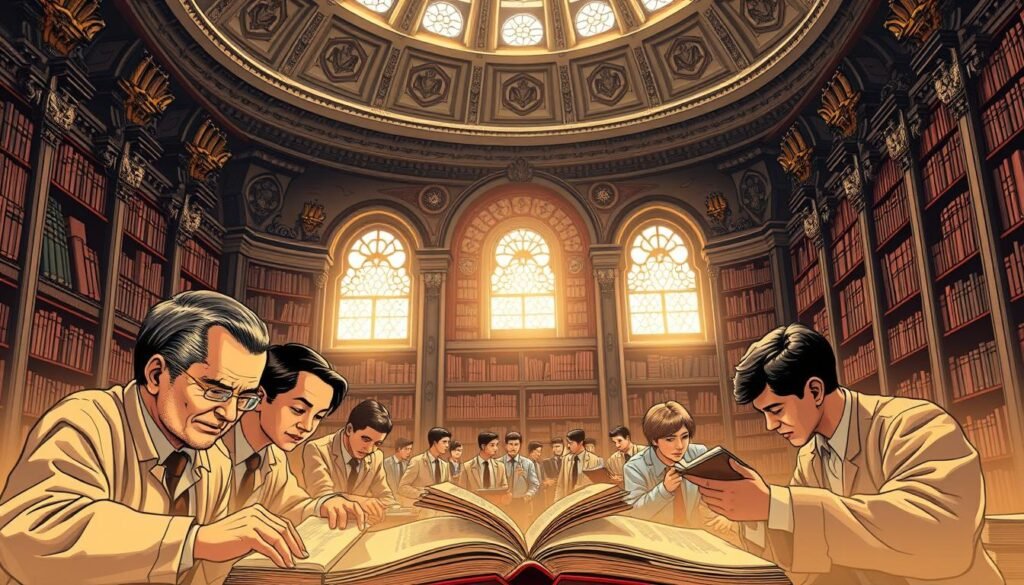
Enduring Impacts on Contemporary Society
Filipino scholars have made key contributions that remain relevant today. For example, José Rizal’s novels, Noli Me Tangere and El Filibusterismo, continue to inspire discussions on national identity and justice. His advocacy for education as a tool for liberation remains a cornerstone of modern Philippine society.
Other figures, like Claro M. Recto and Jovito Salonga, shaped the nation’s legal and political systems. Their work laid the foundation for modern debates on democracy and governance. These contributions highlight the enduring influence of Filipino intellectuals on state policy and public thought.
- Rizal’s writings ignited social awareness and fueled the nationalist movement.
- Recto’s role in drafting the 1935 Constitution shaped the nation’s legal framework.
- Salonga’s academic excellence and activism inspired future leaders.
Books and journalistic efforts have also played a significant role. The press became a platform for public discourse, amplifying voices that challenged the status quo. This tradition continues today, with modern media fostering critical debates on social justice and equality.
“The responsibility of intellectuals is to speak the truth and expose lies.”
The symbiotic relationship between scholarly inquiry and societal challenges remains vital. Filipino thinkers have consistently addressed everyday issues, from inequality to governance. Their legacy fosters continual progress in social and cultural fields, proving that ideas can transform the world.
Contemporary movements, inspired by historical figures, continue to drive change. For instance, modern activists draw on Rizal’s emphasis on education and justice to address current issues. This connection between past and present highlights the importance of preserving and advancing this rich intellectual legacy.
For a deeper exploration of Rizal’s enduring influence, read about Dr. Jose Rizal’s legacy. His contributions remain a timeless inspiration, shaping the Philippines and beyond.
Conclusion
Filipino thinkers have long been at the forefront of shaping the nation’s identity and progress. From the American era to modern times, their contributions have profoundly influenced society, education, and politics. By blending global ideas with local contexts, they have fostered critical thinking and driven meaningful change.
Their work continues to resonate today, bridging historical legacies with contemporary challenges. Whether through literature, activism, or scholarly debates, these individuals have inspired generations to question norms and advocate for justice. Their enduring legacy reminds us of the transformative power of ideas.
As we reflect on their impact, it’s clear that the spirit of inquiry and creative rebellion remains vital. To explore more about how intellectuals shape public discourse, visit this insightful resource. Let their legacy inspire us to continue fostering progress and democracy in the Philippines and beyond.
FAQ
How did the American era influence Filipino intellectualism?
The American era introduced educational reforms and modern pedagogy, fostering a new wave of scholarly thought in the Philippines. This period saw the rise of public figures who bridged academia and activism.
What role did literature play in shaping Filipino national identity?
Literature became a powerful tool for expressing cultural identity and revolutionary ideas. Writers used their works to challenge colonial legacies and inspire creative rebellion.
Who were some trailblazing Filipino scholars during this period?
Figures like José Rizal and Claro M. Recto emerged as influential intellectuals. Their contributions in literature, politics, and education left a lasting impact on Philippine society.
How did gender roles influence scholarly discourse in the Philippines?
Women began to play a significant role in shaping intellectual thought, advocating for gender equality and justice. Their contributions enriched the cultural and political landscape.
What were the long-term impacts of American educational reforms?
American reforms modernized the Philippine education system, laying the foundation for contemporary institutions. These changes also encouraged global exchanges and cross-cultural influences.
How did the press and media contribute to cultural change?
The press became a platform for intellectual debates and social advocacy. It played a crucial role in spreading revolutionary ideas and fostering public discourse.
What is the legacy of Filipino scholars in modern society?
Their enduring contributions continue to inspire contemporary movements in education, politics, and culture. Their work remains a cornerstone of Philippine intellectual tradition.
How did Filipino intellectuals bridge academia and activism?
Many scholars used their platforms to advocate for social justice and political reform. They combined academic rigor with a commitment to public service, influencing policy and societal change.
What were the key themes in Filipino literary works during this era?
Themes of revolution, identity, and resistance dominated Filipino literature. Writers explored the complexities of colonial history and the quest for national independence.
How did global exchanges shape Filipino intellectual thought?
Interactions with Europe, Asia, and the United States enriched Filipino scholarship. These exchanges introduced new ideas and perspectives, shaping modern intellectual traditions.
Source Links
- Philippine Studies: Historical and Ethnographic Viewpoints
- Brains of the Nation: Pedro Paterno, T.H. Pardo de Tavera, Isabelo de los Reyes, and the Production of Modern Knowledge. By Resil B. Mojares. Quezon City: Ateneo de Manila University Press, 2006. 565 pp. ISBN: 9789715504966 (paper). – Orientalists, Propagandists, and Ilustrados: Filipino Scholarship
- Asian Place, Filipino Nation: A Global Intellectual History of the Philippine Revolution, 1887-1912
- Renaissance art | Definition, Characteristics, Style, Examples, & Facts | Britannica
- Literature in the Renaissance | World Civilizations I (HIS101) – Biel
- Renaissance Period: Timeline, Art & Facts
- Ilustrado
- Review– Asian Place, Filipino Nation: A Global Intellectual History of the Philippine Revolution, 1887-1912 – Kyoto Review of Southeast Asia
- Philippines – Colonialism, Revolution, Independence | Britannica
- The Role of Intellectuals in Society
- The Responsibility of Intellectuals
- Chapter I: The Role of Intellectuals: Theories and Interpretive Frameworks
- Education – 20th Century, Reforms, Access | Britannica
- Why We Should Worry About the Decline of American Intellectual History as a Field of Study
- The Crisis of the American Intellectual – The American Interest
- Feminist Political Philosophy
- No title found
- Intersectionality
- Returning home: Intellectuals in (web) salons
- It’s Time to Bring Back the Experience of the Salon. Here’s How to Do It
- Enlightenment Salons – (Intro to Humanities) – Vocab, Definition, Explanations | Fiveable
- Cultural globalization | Pros, Cons, Examples, Impact, & Factors | Britannica
- The Impact of Globalization on Cross-Cultural Communication
- Unity in diversity: navigating global connections through cultural exchange
- Thomas Paine and the Literature of Revolution
- No title found
- Project MUSE – The Intellectual World of Phillis Wheatley and the Politics of Genius
- Microsoft Word – 139018-text.native.1220911322.doc
- 10 Most Influential Filipino Lawyers and Scholars
- The Legacy of Dr. Jose Rizal
- Intellectuals and Society
- The Danger of Intellectuals

